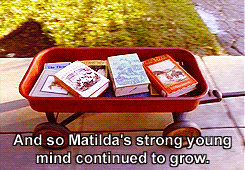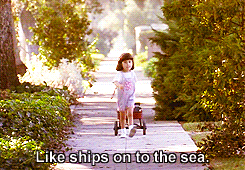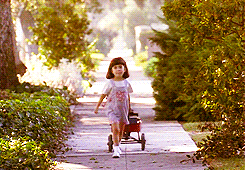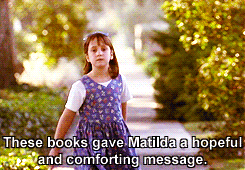Photo
Although it can be difficult to work with the homeless population, the library is so very valuable for people in this situation. I felt very proud to assist these folks when I worked in public libraries.









Portraits of Homeless People Using Libraries
Libraries, “the last bastion of democracy,” are a haven for America’s 500,000 homeless people, where literature, Internet access, and nonfiction can come together to provide respite from the relentless brutality of life on the streets.
In a series of moving portraits of homeless people using San Francisco, Sacramento and San Jose’s public libraries, Fritz Hoffmann tells a visual story of forgotten people in quiet reflection and study, and makes us remember something we’d prefer to forget. The librarians in the story see their role as defending democratic access to information and ideas and public space – in San Francisco, the library system now has a full-time social worker.
(Continue Reading)
1K notes
·
View notes
Quote
The root of the problem, I believe, isn’t simply that men don’t care about women or can’t imagine women’s experiences. It’s that they are actively shamed — even as infants! — when they show interest in anything perceived as “girly” or as a compromise to their masculinity. They’re not supposed to like pink, or dolls, or dresses, or princesses, or stories about girls. They hear it first from their caregivers and authority figures, and then from each other once they’ve internalized the message.
from Let’s Stop Shaming Little Boys Who Read About Girls
(via bookriot)
515 notes
·
View notes
Quote
[Editor’s Note: The author of this piece is a former Marvel employee and wishes to remain anonymous.]
Disney does not care about Marvel’s female market, which makes us virtually invisible. I could probably populate Pluto with the amount of Princess items Disney makes. But where are Gamora and Black Widow? This exclusion of women from Marvel movie merchandise is completely purposeful. I know; I was there.
While working at Marvel post-acquisition, I saw a deck circulated by Disney’s Brand Marketing team. I’m prohibited from sharing the slides, but the takeaway is that, unlike the actual demos, the desired demographics had no females in it whatsoever. I asked my supervisor why that was. Ever the pragmatist, he said, “That’s not why Disney bought us. They already have the girls’ market on lockdown.”
I’d entered the comics industry because I was a comics fan. It hurt to see so plainly that to Disney, people like me didn’t matter. My demographic was already giving them money anyway, with Disney Princess purchases. Even now, there’s no incentive to make more Marvel merch for women, because we already buy Brave and Frozen products.
This does not come as a surprise, really. Anyone who knows about branding and marketing can tell you how most gender-skewed business models work (and most businesses are gender-skewed). It starts when we’re babies. Blue for boys, pink for girls. Separate, but equal. Sound familiar?
Disney bought Marvel and Lucasfilm because they wanted to access the male market. To achieve this goal, they allocate less to Marvel’s female demo, and even less to a unisex one. They won’t be interested in changing how they work until consumers understand what’s going on.
So let’s delve deeper into how licensing works. To obtain a Marvel license, you typically have to be a successful company with access to big distribution channels, like Wal-Mart, Carrefour, Target, Tesco, etc. Marvel sometimes licenses to smaller companies, but the contracts work the same. There’s a minimum guarantee, royalty rates, and a payment schedule.
Most contracts never fall below $100K for a minimum guarantee, and large companies like Hasbro will pay millions over the course of a few years. Royalty rates vary by style guide and distribution channel. Movie style guides tend to have a higher rate due to actor likeness fees, and the standard royalty rate is about 12%. To pay Marvel $25K, a licensee has to make over $208K. Moreover, they need to pay their employees and manufacturers and make a profit. For Marvel movie properties, licensees need to make as much money as possible in a short amount of time. Movie characters are hot only for a few months, so both Disney and the licensees will resort to what they know best: the “separate, but equal” strategy.
Now that my short intro into licensing is over, how do we change things? When complaining about the lack of Black Widow, don’t just tweet at Marvel and Disney. Contact the licensees. They need to know there is a high demand. They need those numbers. Look into companies like Mad Engine, Hasbro, Jay Franco, etc. Look at the tags and find those companies. Demanding Frozen products for boys would be a balanced, conjunctive step.
Another route is to create your own company and get a licensing contract. 3D printers for clothing will soon be available. Save enough capital to buy one and you could flood the market with apparel that feature the Avengers, Justice League, and Guardians of the Galaxy as they were meant to be: co-ed teams.
Personally, I don’t think we need Marvel, DC, or Lucasfilm to pave the way for us. Giants will only move when there are other giants around. For example, when an indie film becomes successful it makes waves and influences the rest of Hollywood. HerUniverse and WeLoveFine are already successfully paving the way for women’s licensed clothing lines. We need more independent content that spotlights women heroes, super or otherwise. Hellboy, Wanted, and The Green Hornet didn’t break into the billions, but they are good examples of putting another horse in the race.
Content is queen. The most lasting way to change what’s around you is to create something new. So, comics creators —especially women—more spectacular women superheroes who headline their own books from Image, Dark Horse, Oni, Top Cow, you name it, would also be incredibly helpful. And indie pubs, make those comics and pitch them to Focus Features, Lionsgate, New Line and so on.
It’s time to start getting creative about our strategy. Let’s all brainstorm and share tactics. In the immortal words of Audre Lorde: “The master’s tools will never dismantle the master’s house.” It’s time to make our own tools.
Invisible Women: Why Marvel’s Gamora & Black Widow Were Missing From Merchandise, And What We Can Do About It
(via fyeahmcublackwidow)
26K notes
·
View notes
Photo










you don’t create n e w w o r l d s to give them
all the same l i m i t s as the old ones
38K notes
·
View notes
Photo

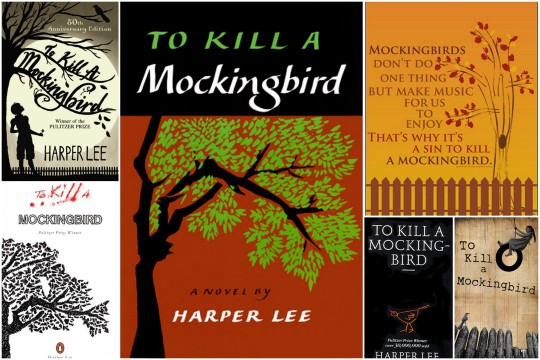
Harper Lee in 2007 — images via Getty and animal-kid.com
AHHH WE’RE SO EXCITED! You’ve probably heard by now that Harper Lee is set to release her second novel this summer, after more than 50 years. The Guardian is reporting that the book, called Go Set a Watchman, has Scout returning to her hometown of Maycomb as an adult.
“She is forced to grapple with issues both personal and political as she tries to understand both her father’s attitude toward society, and her own feelings about the place where she was born and spent her childhood,” her publisher, Penguin Random House, said in announcement.
Lee wrote it in the mid-1950s — and then set it aside, and, amazingly, forgot it. Through her publisher, she tells readers that “after much thought and hesitation I shared it with a handful of people I trust and was pleased to hear that they considered it worthy of publication. I am humbled and amazed that this will now be published after all these years.”
Go Set a Watchman will be released on July 14, under the William Heinemann imprint, which originally published To Kill a Mockingbird.
— Petra
3K notes
·
View notes
Photo



The New York Public Library recently came upon a box of questions posed to the library from the 1940s to the ’80s — a kind of time capsule from an era when humans consulted other humans for answers to their daily questions and conundrums. Queries covered everything from how to put up wallpaper to books about spontaneous combustion.
For more about the archive, check out our interview with librarian Rosa Caballero-Li.
Images courtesy of the New York Public Library
341 notes
·
View notes
Photo

Big in 2014 - Authors to Watch
In alphabetical order.
Laurie Halse Anderson
Jami Attenberg
Leigh Bardugo
Holly Black
Alexandra Bracken
Sarah Rees Brennan
Brandy Colbert
Katie Coyle
John Darnielle
Sarah Dessen
Cory Doctorow
Gayle Forman
Roxane Gay
Emily Gould
Jenny Han
Nick Harkaway
Cristina Henriquez
Michelle Hodkin
Chelsea Hodson
Maureen Johnson
Saeed Jones
Edan Lepucki
Malinda Lo
E. Lockhart
Bennett Madison
Tahereh Mafi
Emily St. John Mandel
Mallory Ortberg
Chuck Palahniuk
Stephanie Perkins
Tamora Pierce
Ransom Riggs
Rainbow Rowell
Laura Ruby
Eliot Schrefer
Emma Straub
Noelle Stevenson
Maggie Stiefvater
Chuck Wendig
Jacqueline Woodson
2K notes
·
View notes
Photo

The Literary United States: A Map of the Best Book for Every State
ALABAMA: To Kill a Mockingbird, Harper Lee: “This time we aren’t fighting the Yankees, we’re fighting our friends. But remember this, no matter how bitter things get, they’re still our friends and this is still our home.”
ALASKA: Into the Wild, John Krakauer: “The very basic core of a man’s living spirit is his passion for adventure. The joy of life comes from our encounters with new experiences, and hence there is no greater joy than to have an endlessly changing horizon, for each day to have a new and different sun.”
ARIZONA: Blood Meridian, Cormac McCarthy: “The universe is no narrow thing and the order within it is not constrained by any latitude in its conception to repeat what exists in one part in any other part. Even in this world more things exist without our knowledge than with it and the order in creation which you see is that which you have put there, like a string in a maze, so that you shall not lose your way.”
ARKANSAS: I Know Why the Caged Bird Sings, Maya Angelou: “If growing up is painful for the Southern Black girl, being aware of her displacement is the rust on the razor that threatens the throat. It is an unnecessary insult.”
CALIFORNIA (southern): The White Boy Shuffle, Paul Beatty: “I was the funny, cool black guy. In Santa Monica, like most predominantly white sanctuaries from urban blight, ‘cool black guy’ is a versatile identifier used to distinguish the harmless black male from the Caucasian juvenile while maintaining politically correct semiotics.”
CALIFORNIA (northern): Suicide Blonde, Darcey Steinke: “You’ll see, there are a million ways to kill off the soft parts of yourself.”
COLORADO: Angle of Repose, Wallace Stegner: “Home is a notion that only nations of the homeless fully appreciate and only the uprooted comprehend.”
CONNECTICUT: Nine Stories, “Uncle Wiggily in Connecticut,” J.D. Salinger: “‘That dopey maid,’ Eloise said without moving from the couch. ‘I dropped two brand-new cartons in front of her nose about an hour ago. She’ll be in, any minute, to ask me what to do with them. Where the hell was I?’”
DELAWARE: The Good Lord Bird, James McBride: “Some things in this world just ain’t meant to be, not in the times we want ‘em to, and the heart has to hold it in this world as a remembrance, a promise for the world that’s to come. There’s a prize at the end of all of it, but still, that’s a heavy load to bear.”
FLORIDA: Their Eyes Were Watching God, Zora Neale Hurston: “She was stretched on her back beneath the pear tree soaking in the alto chant of the visiting bees, the gold of the sun and the panting breath of the breeze when the inaudible voice of it all came to her. She saw a dust-bearing bee sink into the sanctum of a bloom; the thousand sister-calyxes arch to meet the love embrace and the ecstatic shiver of the tree from root to tiniest branch creaming in every blossom and frothing with delight.”
GEORGIA: Cane, Jean Toomer: “Night winds in Georgia are vagrant poets, whispering.”
HAWAII: The Descendants, Kaui Hart Hemmings: “I bet in big cities you can walk down the street scrowling and no one will ask you what’s wrong or encourage you to smile, but everyone here has the attitude that we’re lucky to live in Hawaii; paradise reigns supreme. I think paradise can go fuck itself.”
IDAHO: Train Dreams, Denis Johnson: “He liked the grand size of things in the woods, the feeling of being lost and far away, and the sense he had that with so many trees as wardens, no danger could find him.”
ILLINOIS: Native Son, Richard Wright: “Goddamnit, look! We live here and they live there. We black and they white. They got things and we ain’t. They do things and we can’t. It’s just like livin’ in jail.”
INDIANA: The Stone Diaries, Carol Shields: “It makes her shiver to think of it, how not one pair of eyes can see through the roof and walls of her house and regard her as she moves through her dreamlike days, bargaining from minute to minute with indolence, that tempter.”
IOWA: Gilead, Marilynne Robinson: “There are two occasions when the sacred beauty of Creation becomes dazzlingly apparent, and they occur together. One is when we feel our mortal insufficiency to the world, and the other is when we feel the world’s mortal insufficiency to us.”
KANSAS: In Cold Blood, Truman Capote: “Then starting home, he walked toward the trees, and under them, leaving behind him the big sky, the whisper of wind voices in the wind-bent wheat.”
KENTUCKY: Beloved, Toni Morrison: “It never looked as terrible as it was and it made her wonder if hell was a pretty place too. Fire and brimstone all right, but hidden in lacy groves.”
LOUISIANA: All the King’s Men, Robert Penn Warren: “The air so still it aches like the place where the tooth was on the morning after you’ve been to the dentist or aches like your heart in the bosom when you stand on the street corner waiting for the light to change and happen to recollect how things once were and how they might have been yet if what happened had not happened.”
MAINE: Carrie, Stephen King: “They had become a fixed star in the shifting firmament of the high school’s relationships, the acknowledged Romeo and Juliet. And she knew with sudden hatefulness that there was one couple like them in every white suburban high school in America.”
MARYLAND: Jacob Have I Loved, Katherine Patterson: “All my dreams of leaving, but beneath them I was afraid to go. I had clung to them, to Rass, yes, even to my grandmother, afraid that if I loosened my fingers an iota, I would find myself once more cold and clean in a forgotten basket.”
MASSACHUSETTS: The Bell Jar, Sylvia Plath: “I wanted to be where nobody I knew could ever come.”
MICHIGAN: Split Images, Elmore Leonard: “Coming out of the City-County Building, walking east on Jefferson, they started over and spoke about the weather, looking off at the Ford Auditorium over on the riverfront, the fountain misting in Hart Plaza, Bryan saying it was a little too nice, it wasn’t like April, April in Detroit was miserable, wet and cold with dirty snow left over from the winter; Angela saying she lived in Arizona, Tuscon, and didn’t know much about weather, outside of weather in New York when you wanted a taxi; Bryan said he thought that should about do it for weather, though he could tell her how muggy it got in the summer if she wanted.”
MINNESOTA: Betsy and Tacy Go Downtown, Maud Hart Lovelace: “Betsy was so full of joy that she had to be alone. She went upstairs to her bedroom and sat down on Uncle Keith’s trunk. Behind Tacy’s house the sun had set. A wind had sprung up and the trees, their color dimmed, moved under a brooding sky. All the stories she had told Tacy and Tib seemed to be dancing in those trees, along with all the stories she planned to write some day and all the stories she would read at the library. Good stories. Great stories. The classics. Not Rena’s novels.”
MISSISSIPPI: Long Division, Kiese Laymon: “People always say change takes time. It’s true, but really it’s people who change people, and then those people have to decide if they really want to stay the new people that they’re changed into.”
MISSOURI: Stoner, John Williams: “There was a softness around him, and a languor crept upon his limbs. A sense of his own identity came upon him with a sudden force, and he felt the power of it. He was himself, and he knew what he had been.”
MONTANA: Legends of the Fall, Jim Harrison:“Sitting on the stump under the burden of his father’s death and even the mortality inherent in the dying, wildly colored canopy of leaves, he somehow understood that life was only what one did every day…. Nothing was like anything else, including himself, and everything was changing all of the time. He knew he couldn’t perceive the change because he was changing too, along with everything else.”
NEBRASKA: Eleanor & Park, Rainbow Rowell: “Ever since the first day they’d met, Eleanor was always seeing him in unexpected places. It was like their lives were overlapping lines, like they had their own gravity. Usually, that serendipity felt like the nicest thing the universe had ever done for her.”
NEVADA: Fear and Loathing in Las Vegas, Hunter S. Thompson: “Hallucinations are bad enough. But after awhile you learn to cope with things like seeing your dead grandmother crawling up your leg with a knife in her teeth. Most acid fanciers can handle this sort of thing. But nobody can handle that other trip-the possibility that any freak with $1.98 can walk into the Circus-Circus and suddenly appear in the sky over downtown Las Vegas twelve times the size of God, howling anything that comes into his head. No, this is not a good town for psychedelic drugs.”
NEW HAMPSHIRE: A Prayer for Owen Meany, John Irving: “If you care about something you have to protect it; If you’re lucky enough to find a way of life you love, you have to find the courage to live it.”
NEW JERSEY: American Pastoral, Philip Roth: “Yes, alone we are, deeply alone, and always, in store for us, a layer of loneliness even deeper. There is nothing we can do to dispose of that. No, loneliness shouldn’t surprise us, as astonishing to experience as it may be. You can try yourself inside out, but all you are then is inside out and lonely instead of inside in and lonely.”
NEW MEXICO: Leave Her to Heaven, Ben Ames Williams: “To be lonely is one thing; to be alone is another. There is no loneliness so acute as that of a man upon a pillory, facing ten thousand eyes; but to be alone is to be free, free from eyes and tongues that watch and question and condemn.”
NEW YORK STATE: Foxfire: Confessions of a Girl Gang, Joyce Carol Oates:“Legs squinted up at the sky, the moon so bright you’d never think it could be merely rock like the earth’s common rock and lifeless, merely reflected light from an invisible sun and not a powerful living light of its own.”
NEW YORK CITY: Daddy Was a Number Runner, Louise Meriwether: “Lord, but that hallway was funky, all of those Harlem smells bumping together… The air outside wasn’t much better. It was a hot, stifling day, June 2, 1934. The curbs were lined with garbage cans overflowing into the gutters, and a droopy horse pulling a vegetable cart down the avenue had just deposited a steaming pile of manure in the middle of the street. The sudden heat had emptied the tenements. Kids too young for school played on the sidewalks while their mamas leaned out of their windows searching for a cool breeze or sat for a moment on the fire escape.”
NORTH CAROLINA: Look Homeward Angel, Thomas Wolfe: “The mountains were his masters. They rimmed in life. They were the cup of reality, beyond growth, beyond struggle and death. They were his absolute unity in the midst of eternal change.”
NORTH DAKOTA: The Round House, Louise Erdrich: “I stood there in the shadowed doorway thinking with my tears. Yes, tears can be thoughts, why not?”
OHIO: The Bluest Eye, Toni Morrison: “Certain seeds it will not nurture, certain fruit it will not bear and when the land kills of its own volition, we acquiesce and say the victim had no right to live.”
OKLAHOMA: The Outsiders, S.E. Hinton: “The dawn was coming then. All the lower valley was covered with mist, and sometimes little pieces of it broke off and floated away in small clouds. The sky was lighter in the east, and the horizon was a thin golden line. The clouds changed from gray to pink, and the mist was touched with gold. There was a silent moment when everything held its breath, and then the sun rose. It was beautiful.”
OREGON: No One Belongs Here More Than You, Miranda July: “Look at the sky: that is for you. Look at each person’s face as you pass on the street: those faces are for you. And the street itself, and the ground under the street and the ball of fire underneath the ground: all these things are for you. They are as much for you as they are for other people. Remember this when you wake up in the morning and think you have nothing. Stand up and face the east. Now praise the sky and praise the light within each person under the sky. It’s okay to be unsure. But praise, praise, praise.”
PENNSYLVANIA: The Mysteries of Pittsburgh, Michael Chabon: “I smoked and looked down at the bottom of Pittsburgh for a little while, watching the kids playing tiny baseball, the distant figures of dogs snatching at a little passing car, a miniature housewife on her back porch shaking out a snippet of red rug, and I made a sudden, frightened vow never to become that small, and to devote myself to getting bigger and bigger and bigger.”
RHODE ISLAND: The Witches of Eastwick, John Updike: “Some people find fall depressing, others hate spring. I’ve always been a spring person myself. All that growth, you can feel Nature groaning, the old bitch; she doesn’t want to do it, not again, no, anything but that, but she has to. It’s a fucking torture rack, all that budding and pushing, the sap up the tree trunks, the weeds and the insects getting set to fight it out once again, the seeds trying to remember how the hell the DNA is supposed to go, all that competition for a little bit of nitrogen; Christ, it’s cruel.”
SOUTH CAROLINA: Bastard Out of Carolina, Dorothy Allison: “Anney makes the best gravy in the county, the sweetest biscuits, and puts just enough vinegar in those greens. Glenn nodded, though the truth was he’d never had much of a taste for greens, and his well-educated mama had always told him that gravy was bad for the heart. So he was not ready for the moment when Mama pushed her short blond hair back and set that big plate of hot food down in front of his open hands. Glenn took a bite of gristly meat and gravy, and it melted between his teeth. The greens were salt sweet and fat rich. His tongue sang to his throat; his neck went loose, and his hair fell across his face. It was like sex, that food, too good to waste on the middle of the day and a roomful of men too tired to taste.”
SOUTH DAKOTA: Little Town on the Prairie, Laura Ingalls Wilder: “There is no comfort anywhere for anyone who dreads to go home.”
TEXAS: Lonesome Dove, Larry McMurtry: “The eastern sky was red as coals in a forge, lighting up the flats along the river. Dew had wet the million needles of the chaparral, and when the rim of the sun edged over the horizon the chaparral seemed to be spotted with diamonds. A bush in the backyard was filled with little rainbows as the sun touched the dew… The sun spread reddish-gold light through the shining bushes, among which a few goats wandered, bleating. Even when the sun rose above the low bluffs to the south, a layer of light lingered for a bit at the level of the chaparral, as if independent of its source. The the sun lifted clear, like an immense coin. The dew quickly died, and the light that filled the bushes like red dirt dispersed, leaving clear, slightly bluish air.”
TENNESSEE: Child of God, Cormac McCarthy: “Each leaf that brushed his face deepened his sadness and dread. Each leaf he passed he’d never pass again. They rode over his face like veils, already some yellow, their veins like slender bones where the sun shone through them. He had resolved himself to ride on for he could not turn back and the world that day was as lovely as any day that ever was and he was riding to his death.”
UTAH: The Executioner’s Song, Norman Mailer: “[B]ut when the call came from Shirley Pedler to help in organizing the Utah Coalition Against the Death Penalty, she knew she would go out in the world again with her freaky blond hair, blond to everyone’s disbelief—at the age of fifty-four, go out in her denims and chin-length-hanging-down-straight vanilla hair to that Salt Lake world where nobody would ever make the mistake of thinking she was a native Utah lady inasmuch as Utah was the Beehive State. The girls went big for vertical hair-dos, pure monuments to shellac.”
VIRGINIA: The Confessions of Nat Turner, William Styron: “Surely mankind has yet to be born. Surely this is true! For only something blind and uncomprehending could exist in such a mean conjunction with its own flesh, its own kind. How else account for such faltering, clumsy, hateful cruelty?… Yes, it could be that mankind has yet to be born.”
VERMONT: The Secret History, Donna Tartt: “White Sky. Trees fading at the skyline, the mountains gone… I never got used to the way the horizon there could just erase itself and leave you marooned, adrift, in an incomplete dreamscape that was like a sketch for the world you knew—the outline of a single tree standing in for a grove, lamp-posts and chimneys floating up out of context before the surrounding canvas was filled in-an amnesia-land, a kind of skewed Heaven where the old landmarks were recognizable but spaced too far apart, and disarranged, and made terrible by the emptiness around them.”
WYOMING: Close Range: Wyoming Stories “Brokeback Mountain,” E. Annie Proulx: “He pressed his face into the fabric and breathed in slowly through his mouth and nose, hoping for the faintest smoke and mountain sage and salty sweet stink of Jack but there was no real scent, only the memory of it, the imagined power of Brokeback Mountain of which nothing was left but what he held in his hands.”
WISCONSIN: The Art of Fielding, Chad Harbach: “Each of us, deep down, believes that the whole world issues from his own precious body, like images projected from a tiny slide onto an earth-sized screen. And then, deeper down, each of us knows he’s wrong.”
WASHINGTON: The Lone Ranger and Tonto Fistfight in Heaven, Sherman Alexie: “Seems like the cold would never go away and winter would be like the bottom of my feet but then it is gone in one night and in its place comes the sun so large and laughable.”
WASHINGTON DC: You Are One of Them, Elliot Holt: ”It does no good to see everything as a struggle between opposing factions. Few things are that simple.”
WEST VIRGINIA: The Glass Castle, Jeanette Walls: “Those shining stars, he liked to point out, were one of the special treats for people like us who lived out in the wilderness. Rich city folks, he’d say, lived in fancy apartments, but their air was so polluted they couldn’t even see the stars. We’d have to be out of our minds to want to trade places with any of them.”
(x)
5K notes
·
View notes
Photo
This is breaking my heart.


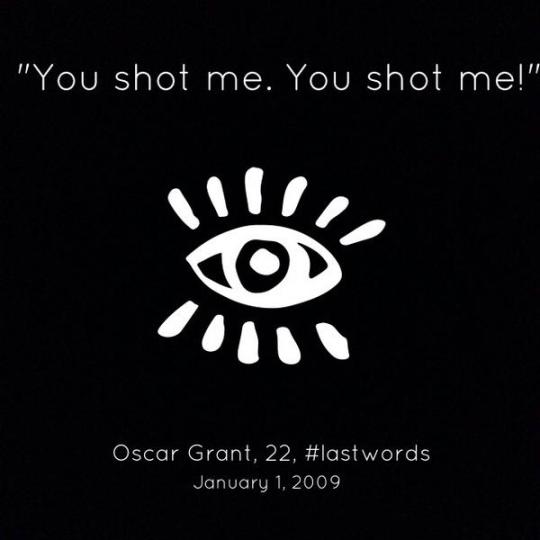
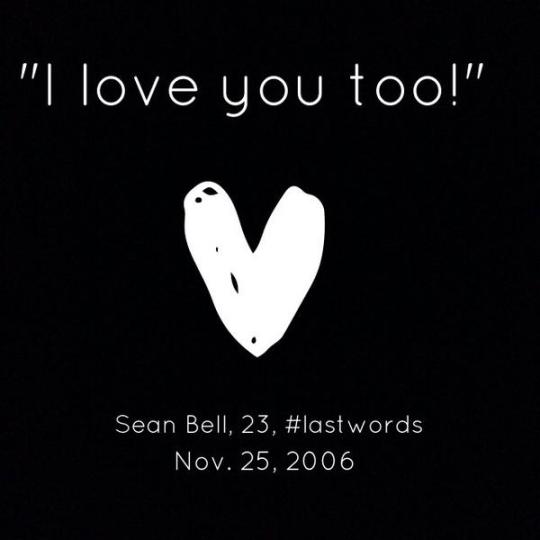


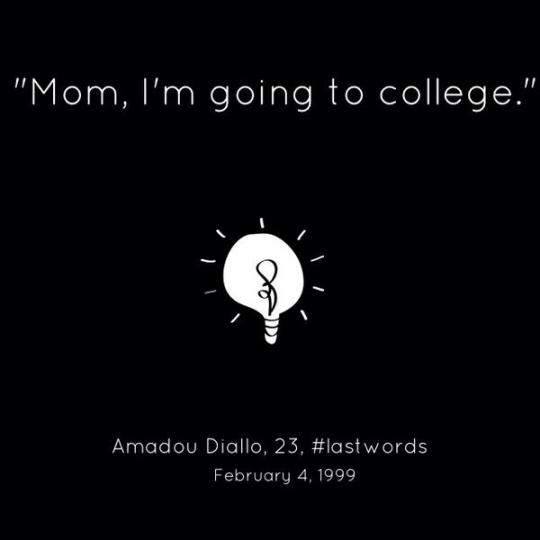
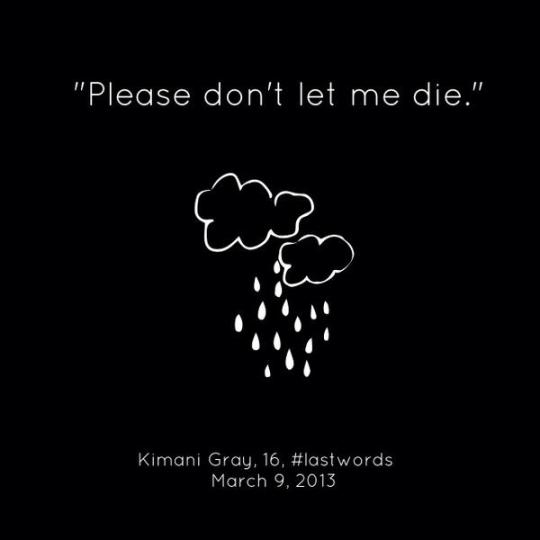
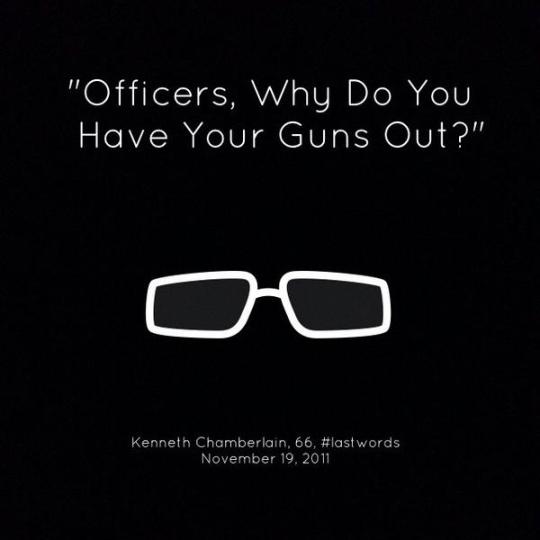
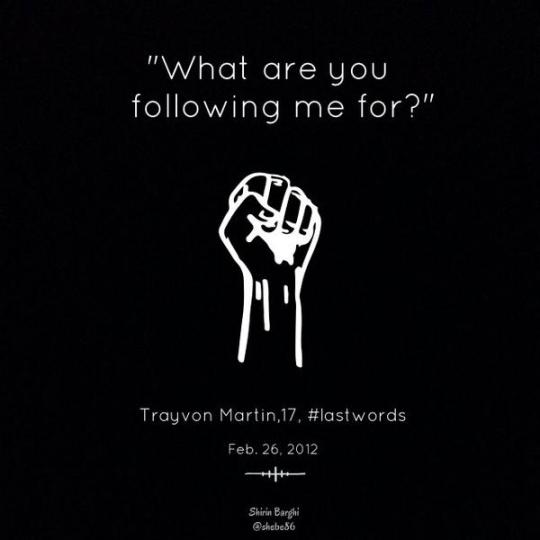
Potent minimalist art sends a strong message about police and vigilante brutality in America
Journalist and artist Shirin Barghi has created a gripping, thought-provoking series of graphics that not only examines racial prejudice in today’s America, but also captures the sense of humanity that often gets lost in news coverage. Titled “Last Words,” the graphics illustrate the last recorded words by Brown and other young black people — Trayvon Martin, Oscar Grant and others — who have been killed by police in recent years.
Let us not forget their voices
629K notes
·
View notes
Photo

Image: Neil Gaiman at the Warner Brothers TV 2013 SXSW party. (Tim Mosenfelder/Getty Images).
Today, November 10, is Neil Gaiman’s birthday. The author of American Gods, Coraline and the Sandman comic books was born in 1960 in Portchester, England, and describes himself as a “feral child who was raised in libraries.”
“I wouldn’t be who I am without libraries,” he says on his website. “I was the sort of kid who devoured books, and my happiest times as a boy were when I persuaded my parents to drop me off in the local library on their way to work, and I spent the day there.”
Yeah, we can relate. HBD, Neil!
138 notes
·
View notes
Photo
What!

THE BEST book news item of the day:
One corner of the Internet just about combusted recently with news that the cult TV show Twin Peakswould be revived on Showtime in 2016, some 25 years after its most recent episode aired. Now, Peaksfans, prepare for more: Mark Frost, who created the show with David Lynch, is also writing a book that follows the show’s characters in the decades since last we saw them. The Secret Lives of Twin Peaks will be published shortly before the show returns to the air.
More book news here.
Image via angelswouldnthelpyou
203 notes
·
View notes
Note
EXACTLY CORRECT.
When you read the Narnia books, do you start with "The Magician's Nephew" or do you start with "The Lion, the Witch, and the Wardrobe"? I've read many places that you read them to your children, and I was curious about where you started.
I always start with The Lion, the Witch and the Wardrobe, because otherwise you would read it already knowing who Aslan is and what Narnia is. It’s much more fun hitting The Magician’s Nephew afterwards and learning the backstory in the way that C.S. Lewis learned it. (In my opinion, of course. Your mileage may vary.)
957 notes
·
View notes
Photo

Can we talk about how much I want the hot chocolate pot from McDuff Moves In? #picturebooks
0 notes









